Chinese civilization is one of the oldest on earth. The country is the size of all of Europe, has a population of 1.2 billion and is one of the most important countries of the world with a dynamic and rapidly growing economy. China, was until the end of the 18th century, an isolated country far removed from Western culture. For this reason Chinese society managed to preserve its traditional superstitious religions and culture over the centuries, but with the arrival of British trade in the 19th Century, social life began to change. In 1949, the communist party came to power and China was changed forever. The militants of Mao Zedong had fought a guerrilla war for years setting up “freed zones” as they went along. They staged the second biggest communist revolution in history and took over the government. China became a feared country under Mao’s rule. His arrival brought genocide, torture, destitution and famine to the Chinese people. Nonetheless, communism has been China's identity, and it's people’s ideology since Mao came to power in 1949, though successive leaders, such as Deng Xiaoping ultimately introduced badly needed economic reforms, and have subsequently improved the overall socioeconomic climate dramatically.
Chinese culture has been influenced by Buddhism, Confucianism and Taoism besides communism.
Shamanism is considered perhaps the oldest superstitious religion in China. This pagan religion is founded on the erroneous belief that the “Kam”, the Shaman priest, communicates directly with the spirit world and that with the imaginary power he thus derives from there he can prevent evil, heal the sick, exorcise demons or evil spirits, lead one on the path to eternal life or prolong it. (Surely Allah is beyond that.)
Shamanism was the dominant belief in China before Confucianism emerged. It was the support for Confucianism by the ruling classes that led to its widespread acceptance by the people, thereby eroding the influence of Shamanism in society.
Shamanism and Confucianism are wholly contradictory to one another. Confucianism appears to be an ethical teaching or a philosophy, even though it does not have a concept of Allah or the hereafter and is, as such, a “false” religion. Contrary to Confucianism, Shamans believe in the power of the “Kam”, in sorcery and the power of good or evil spirits over people. Confucianism is perceived to promote the values of “reason, reality, order, control and balance”. Shamans, on the other hand, were considered an ignorant, disorderly and anarchistic lot which meant that Confucianism rose upon the decline of Shamanism. However the decline of Shamanism did not mean that its erroneous beliefs, sorcery and quest for eternal life on earth disappeared completely. Some magic potions, formulae, rituals and other acts of sorcery were commonly believed by Chinese people to prevent death. Even some Chinese emperors supported this irrational belief and its accompanying perverted rituals which ultimately led to the creation of another pagan religion. In the 2nd century AD, a number of schools of sorcery, spiritualism and healers regrouped around certain shaman leaders. This new movement of exorcism, quest for eternal life and other futile Shaman practices was offered to people under the name of Taoism.
We will examine over the next pages Taoism and the other pagan religions that shaped China, but it will be of benefit to examine Shamanism as the ancient superstitious religion of China (and many other Asian countries) a little closer.
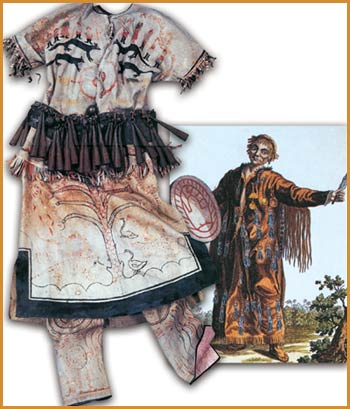
Shamanism is a heretical, magical faith. Shamanist priests wear the kind of peculiar clothing seen in the picture to the side and allegedly enter the spirit world. Below is a depiction of a Siberian shaman.
Shamanism is a pagan religion that emerged in prehistory in Siberia and spread through Central Asia’s tribal communities. Shamanism has two perverse principles:
-It is mistakenly believed that everything in nature (stones, soil, water, trees etc.) has both a soul and a will, and that it is therefore necessary to maintain a dialogue with them. (Surely Allah is beyond that.)
-The person who can establish this dialogue is the “Shaman” who communicates with these objects in nature through trance inducing rhythms, burning incense and dancing. He tries to convince them in order to heal. (Surely Allah is beyond that.)
The belief in nature’s soul and will is central to Shamanism. For instance, it holds the irrational and illogical belief that rain is caused by a spirit living in clouds, or that fire is lit and maintained by the “fire spirit”.
This superstitious belief is contained in many ancient pagan religions and is otherwise known as “animism”, which is the belief that every single thing in nature is a spirit or supposed deity. The superstitious Shaman religion is a form of animism specific to Central Asia. The famous anthropologist Ivar Paulson sums it up by saying: “Shamanism is an animistic ideology”.123
N. A. Alekseev, who researched various branches of Shamanism in Siberia and central Asia, published a book in 1980 and describes their strange ways of belief in the chapter titled: “The Idolization of Natural Powers and Phenomena” (Surely Allah is beyond that.):
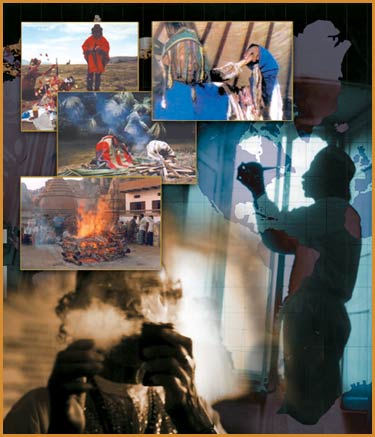
There are various shamanist communities around the world, especially in Asia and America. The nonsensical spells caste and the heretical rites and ceremonies performed never change, however.
"According to the beliefs of Southern Altaic peoples, every mountain, every lake or river has its own spirit owner, which owns the place, and is in command of the animals and birds living there. It could protect people who lived there or crossed the area. Spirit owners were believed to be able to understand human speech, and the myths associated with them say that, like people, they also had children, and one could obtain their goodwill with prayers, supplications and sacrifices".124
Superstitious Shamanism is an idolatrous religion that ascribes partners to Allah. Its adherents believe in countless imaginary “deities,” imagine that they pray to them and make sacrifices. Each river, lake, forest or mountain is considered to be another supposed deity and they are all revered in a most perverse manner.
La ilaha illa Allah (There is no other god but Allah), is the central principle of Islam, and it is evident that such erroneous animist beliefs are incompatible with reason, as well as Islam. Rocks, soil or water have no soul and they have been created by the Lord of the universe, Allah. Shamanists however, do not comprehend the fact that the whole universe has only One Creator and Lord and they are a people who have acquired many false idols and therefore ascribe partners to Allah.
Allah reveals the irrationality of people who ascribe partners to Him as follows:
Allah… There is no other god accompanying Him, for then each god would have gone off with what He created and one of them would have been exalted above the other. Glory be to Allah above what they describe. (Surat al-Muminun: 91)
Careful consideration of the facts reveals that there are many similarities between superstitious Shamanism and the old Arab (and other idolatrous tribes’) beliefs when they were confronted by the prophets. Pagans perversely believed in many nature gods like the “sky god”, “earth god”, “prosperity god”, “war god” etc. They then made their representative figures and worshipped them. The only difference in Shamanism is that they did not make carved idols of their imaginary deities. Instead, the shaman turned to the sky, earth, sea, lake or forest and worshipped them. In the end, all these teachings amount to ascribing partners to Allah and are a terrible perversion.
Despite the fact that superstitious Shamanism was a myth that contradicted reason and logic, it nevertheless was passed down from generation to generation, each generation adopting it as a tradition of their forefathers. Many tribes and nations ignorantly continued to worship and make sacrifices to mountains, rocks or rivers even though they could clearly see that these objects have neither reason nor will. The dialogue between the Prophet Abraham (pbuh) and his people is revealed as follows in the Qur’an:
Recite to them the story of Abraham when he said to his father and his people, “What do you worship?” They said, “We worship idols and will continue to cling to them.” He said, “Do they hear you when you call or do they help you or do you harm?” They said, “No, but this is what we found our fathers doing.” (Surat ash-Shu‘ara’: 69-74)

Despite being irrational and illogical nonsense, shamanism has been passed down from generation to generation, and every generation has accepted it as a tradition handed on from its forebears. Ceremonies performed hundreds of years ago are still performed in exactly the same manner today.
The myth of supposedly divine objects in nature is a central belief of Shamanism and has led them to develop strange rituals:
"The Shors believe in the existence of mountain spirits (tag-azi) and water spirits (shug-azi). Every clan had its own clan mountain and its mountain spirit, who protected the members of the clan. Every three years sacrificial ceremonies were held on that mountain. To express their respect, every Shor threw a libation to the spirit owner of the mountain or river, when he or she was near the mountain or river... The spirit owner of the waters was imagined as a long-armed naked woman by the Kumandines... The Tuvans used to believe in the spirit owners of the waters. They made an ovaa of stones and dry branches for her, too, on the riverbanks, and near the fords. This looked like a hut, and they placed the sacrificial objects in it: stones, rags, horsehair etc. Before crossing the river they usually performed a sacrifice."125
The Shamans’ perverse belief in this imaginary water goddess is reminiscent of other pagans’ belief in the so-called prosperity goddess. Anthropologist S. M. Malinovskaya syas: “Before Shamans began fishing at a certain spot, they were making offerings or sacrifices to the mythical water goddess.”126
The “fire cult” is part of perverse Shamanism’s culture just like in many other pagan religions. Shamans believe that fire has a spirit which must be placated, to which end they traditionally make perverse offerings or sacrifices to fires.
The totem-worshiping Samoyeds also ignorantly believed that fire was a living being, notably an old woman. The licking flames of the fire are her movements, and she is the guardian of the tent, who immediately gets angry if someone throws trash or trodden wood shavings, or spits into the fire, or hits it. When children lost their teeth, they were told to throw the teeth into the fire, so that “Old Grandmother Fire” would give them new ones . They where awed by fire, and respected its power so much that they ignorantly swore by it, saying "May I be devoured by Old Grandmother Fire if I am guilty!"127
Among the Turkic peoples of Siberia the Tuvans held the compulsory family holiday "fire-feast," which meant that under the direction of the most powerful shaman, they perversely sacrificed a lamb or a calf to the fire. They fed the fire with oil and butter, so that for the following year the spirit would provide the family members with both health and happiness.128
Shamans of Yakut origins truly exaggerated the fire spirit (Uat Iccite) in the sense that they had made him into a supposed Sun god, as in Zoroastrianism. Anatolij Ignatevia Gogolev says the following in his book about the Yakut and these perverted and superstitious beliefs:
"The fire, burning in the family hearth, however, understands brilliantly what is being said and done around him. Hence the warning that it would be dangerous to insult the fire. It was thought of as a living being, wherefore it was not advisable to poke at fire with iron. Housewives always attempted to keep the fire satisfied, and they gave him a piece of everything they cooked or baked. Similarly he got some from the results of a lucky hunting expedition”.129
Another feature of pagan Shamanists is that they, with their low minds, considered women and girls as “spiritually filthy” beings. So much so that they forbade women or girls to step on and supposedly “pollute” fire, which they literally regarded as a supposed deity. Prof. M. Ya Barmich from the Russian Humanities Educational University, writes the following in his book on perverse Shamanist beliefs:
“The taboos connected with the cult of fire are aimed not to hurt or pollute fire which gives pure warmth and to life property, so that the people are forbidden to pour water on fire hastily, throw any unclean sweepings to the fire, or to spit into the fire. It used to be forbidden to stir up fire with sharp metal objects, otherwise the hostess of fire might be wounded. Women and girls are forbidden to step over the fire, since they are considered unclean and may pollute the fire."130
Shamanism is a belief of ignorance. Just as the Arabs worshipped idols, perversely ascribing beings other than Allah with powers that were only attributable to him, Shamans went astray by ascribing divinity to mountains, rocks, soil and fire within their mythological beliefs.
It is a quality of ignorance not to reflect. Idol worshippers or people who perversely ascribe partners to Allah cannot comprehend, or in other words ponder, that all things in nature are Allah’s creation, that they have no will or power by themselves. All people who perversely worshipped the Fire, Sun or Moon got stuck in this irrationality. Allah reveals in the Qur’an the irrationality of people who worship the created like the Sun or Moon:
Among His Signs are the night and day and the sun and moon. Do not prostrate to the sun nor to the moon. Prostrate to Allah Who created them, if you worship Him. (Surah Fussilat: 37)
China, following centuries of Shamanism’s domination of the lands, became the home for three further superstitious religions which are still widely practiced. These are Buddhism, Taoism and Confucianism. These pagan religions were greatly influenced by one another and interchanged traditions and practices. For this reason many researchers choose to examine these perverse religions together. One of these is Buddhism, which initially emerged in India in the 6th Century BC as an alternative to Hinduism. By the time it had made its way into China, it had fused together with other Chinese religious concepts and became therefore known as Chinese Buddhism. We have examined the erroneous practices of Buddhism, with its perverse worship of the Buddha and requiring poverty and destitution from its adherents, in great detail in our book entitled Islam and Buddhism.
The interrelation between these three false religions is pronounced with the Chinese saying “three religions are one religion”. Chinese people consider all three religions as complimentary to one another. Whilst Confucianism concentrates on social life and state governance, Taoism and Buddhism focus on people’s spiritual development and everyday life with their rituals, false beliefs and rites. Even though there a large number of Buddhists in China, it is not considered a national religion because it still contains Hindu principles and practices, which is why Chinese culture tends to revolve more around Confucianism and Taoism.

Konfüçyüs
Confucianism is a social system that has at present approximately 200 million followers and is deeply rooted in Chinese culture. Its teachings are also widely practiced in Japan, Burma, Singapore and Thailand. It is the ordered and systemized product of various religions that have been practiced during China’s 4,000-year history.
Superstitious Chinese religions are based on many nonsensical teachings and rest on the principle of faith in imaginary deities, and the spirits of ancestors, earth, water, mountains, forests and nature in general. Pagan rituals, acts of worship, sorcery, fortune telling and clairvoyance are common ground in Chinese society. The ancient agricultural society of China worshipped nature in ignorance, which they believed to be responsible for prosperity and famine, wealth and poverty. Furthermore, they believed in the influence of stars on everything that took place on earth and therefore revered them as divinities. The spirits of deceased ancestors were revered above all else in their own foolish eyes. It was believed that they walked invisibly among men and exercised positive or negative influence over the lives of the living.
Besides all these divinities, there is another supposed “god” (Tien) above them in Chinese systems of faith. They believe that all other imaginary deities are subordinate to Tien, and follow his directives. As we have previously stated, this belief contradicts the monotheism of the Divine religions (to believe in Allah as the One and Only) and bears resemblance to idolatrous societies described in the Qur’an. People who have a monotheistic belief submit only to the all- powerful and Almighty Lord, ask only Allah for help, fear only Him and love only our exalted Lord. Idolaters on the other hand ascribe to beings other than Allah various powers, revere them in their own eyes and foolishly pray for their help. The pagan Chinese people worship invented idols, perform rituals for them, make offerings of food and presents to them and ask them to provide for their needs. Allah reveals the situation of people who follow blindly in the footsteps of their forefathers and ascribe partners to Him as follows:
They are nothing but names which you yourselves have given, you and your forefathers. Allah has sent down no authority for them. They are following nothing but conjecture and what their own selves desire. And that when guidance has reached them from their Lord! (Surat an-Najm: 23)
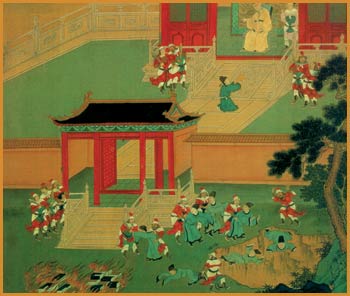
A picture depicting the burning of written texts and the killing of priests by the Emperor Ch'in Shih Huang Ti'nin.
Confucianism is based on pagan traditional religions that have existed for over 2500 years in China and is widely considered to be the ultimate socioethic guidance.
Confucianism is not a true religion based on Allah’s revelations but is a system formulated by the Chinese thinker Confucius. This system, formulated by K’ung Tzu (551-479 BC), otherwise known in the West as Confucius131, does not make any reference to matters of religious substance, death or the hereafter. In time it evolved into a false religion that spread across the Far East.
Confucius was born in China’s Shangtung province and lived five centuries before Christ’s birth during the reign of the Chou Dynasty (BD 1027-256). His primary aim was to revive the ethical values of the initial period of the Chou dynasty because according to him, this was the “golden era” of the ruling dynasty. He believed that reviving these values was the only way of ensuring Chinese unity. For this reason he chose to reform and systemize the various beliefs, traditions and rituals that had dominated China for centuries rather than formulating a new system from scratch. The system he formulated focused on the social order. It regulated interfamilial relations, teacher-student relations, and sought to place the citizen-state relations on a sound footing. However, whilst he was realizing his ambition, he also reintroduced many pagan practices from ancient superstitious religions like reverence of ancestors, making offerings to them and considering women as second class citizens. There were other perverted practices he inherited from pagan religions existing in China that were not based on Divine revelations. As there was no concept of life in the hereafter, Judgment Day, fate, hell and paradise in the ancient superstitious Chinese religions, he made no mention of these realities revealed in Allah’s Divine scriptures in the system he formulated. He did not reply or comment on such questions.132 The system he tried to establish was thus doomed from the outset. As we will examine in greater detail over the coming pages, virtue is only possible with the fear of Allah and loving Him very deeply. For a person to be virtuous and consistent, a deep love as well as fear of Allah is essential.
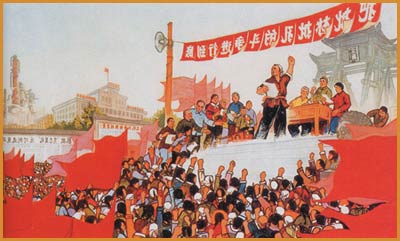
Maoists held anti-Confucian rallies all over China, and resorted to all forms of oppression in order to eradicate Confucianism from the country.
At the beginning of the Chou dynasty, political unity and power was the most significant entity which had been gradually eroded by conflicts between the city states that formed the basis of the dynasty, by warring factions with imperialistic ambitions and attacks by marauding nomadic tribes. Confucius’ city came under the rule of occupying forces. At this time, Confucius began to travel from royal court to royal court with a small group of his followers teaching and advising rulers as he went along. Within a short period of time he was appointed first a judge and then a justice minister. During this period Confucius’ social system became highly influential in the workings of the state bureaucracy, but as it was also causing discomfort in certain circles he was forced to resign from his office. From then on he spent the rest of his life teaching his ethical social system until his death at the age of 74 in 478 BC.
Two centuries after his death the Sung dynasty was founded in China, and the emperor of the dynasty managed to establish his rule across all the provinces of the country. However, he was not as successful in banishing the followers of Confucianism as he wished, so he therefore had all books on Confucianism burned bar none. This action apparently proving insufficient to the emperor, he contented himself with having hundreds of Confucians burned alive as well. The Han dynasty, on the other hand, adopted a respectful stance towards Confucianism. Confucius himself had not left any written material behind, but his followers published a collection of his teachings under the name of “Great Knowledge and the Doctrine of the Middle Path” during the Han dynasty.
During the reign of the Han dynasty Confucianism became the official religion of China, and remained so for the next two thousand years, during which it changed considerably. The emperor became also the high priest known as the “Son of heaven” (Allah forbid). The worship of the heavens and the earth entered the teachings and for centuries, almost all government agencies, traditions and the social order were based on Confucius’s heretic beliefs. Between the years of 1313 and 1905, the entry exams for civil servants required knowledge of “the four books of Confucius” and until 1912, this system was an obligatory subject in the education system. Consequently, whole generations emerged that lived only for the world, never reflected on death, the hereafter or Judgment Day, seeking happiness instead in perverse and meaningless rituals.
The influence of Confucianism began to decline in 1911 when the empire collapsed. During Mao’s reign, Confucianism was declared the arch enemy and he had first all religious centers subordinated to the central authority, and then turned them into Maoist propaganda centers. Mao ordered all temples destroyed and all religious books burned, and Confucians began to be persecuted. Successive regimes subsequently eased the pressure and, especially in recent history, Confucianism’s heretical principles have begun to play a role in everyday life once more. At present Confucianism plays an important, albeit unofficial, role in public life. Indeed, many Sinologists have referred to current Chinese government doctrine as “neo-Confucianism”.
In Japan it has about 10 million followers where it enjoys widespread support in society.
Confucius’ life is largely mythological as far as in the written records are concerned, the reason being that there are no written records remaining from that period. All of what is today the written material was based on verbal transmissions. At present the material available to us consists of his views reworked, altered and rearranged by his followers. This is what comes to mind when Confucianism is spoken of, and it is therefore all but impossible to verify the authenticity of the material accredited to him. However it is still possible to get a picture of his fundamental ideas from the available material.
* Confucius and Belief in Allah
Works written on Confucius claim that he had a belief in Allah, and it is possible to encounter claims that he believed in a “god of the Heavens”, but the works accredited to him make no reference to a belief in Allah. Confucius advises people to be individuals of virtue, describes deeds that are damaging to law and order and sets the rules for inter-personal relations. Besides these, he does not make any revelations, answer questions or refer to subjects like death or fate. His views are based on the principle that “all people are good from birth and that they therefore do not require divine guidance”.
Virtue, in reality, is only attainable with the fear of Allah and total compliance with His commandments. Fear of, as well as love for, Allah is absolutely essential for consistent, good morality. To fear Allah appropriately is dependent on the constant awareness of Allah’s greatness, power and might, His infinite knowledge, His ability to do anything He wishes and His total power and sovereignty over His servants. It also requires a faith free of doubt in His promises, warnings, the Day of Judgment, the severity of His punishment and the eternity of His vengeance in hellfire which gives rise to the fear of Him. This fear leads people to act, behave, move and speak according to Allah’s good pleasure and the morality He prescribes. An Allah-fearing person will be sensitive to His limits.

Everything in the heavens and earth belongs to Him, and the religion belongs to Him, firmly and for ever. So why do you fear anyone other than Allah? (Surat an-Nahl, 52)
People who do not fear Allah on the other hand will, or can, do anything He does not approve of. For instance, someone abiding by Confucius’s rules can, when his self interest requires him to do so, easily act in a manner contrary to these principles. He can lie where he should be honest, steal when he is in need or be corrupt because there is simply nothing to prevent him. There is no reason for someone who has forgotten that he will be held accountable by Allah, to be honest, to be selfless, to be just and honorable; in short, to be of virtue. His character is defined by his self-interest and ambitions and he has no reason for being moral towards anyone whatsoever. As he cannot comprehend Allah’s determination of destiny, His threat of punishment is no hindrance for him. He can be aggressive, cruel and unrestrained towards others as he does not fear Allah and His wrath. He does not ponder Allah’s might and punishment as he transgresses against His limits. For such reasons, people devoid of the fear of Allah are liable to commit sin and immorality irrespective of the social system they are subject to.
For people who have no faith in and fear of Allah, the world is disorderly and unpredictable. They think that everything happens accidentally or coincidentally. In such an environment a sense of security and happiness cannot develop, because at any time, something can happen to them that may be distressing, saddening or damaging. They have countless anxieties and worries about the future such as suffering from a terminal illness, bankruptcy or a separation from his beloved ones or an unforeseen tragedy that may strike them anywhere. As they believe that all these events are uncontrolled, they have a separate fear of each of them. As they know, they have no control over these events, they are susceptible to great despair and hopelessness. There are many rivals in their environment waiting for an opportunity to take advantage of them and it is not possible to fight them all. They are constantly trying to discover what others think of them, which causes severe stress and tensions. Someone who has faith in and fears Allah has none of these issues. The fear of Allah and faith in Him removes all such worries. Knowing that Allah is the Owner and Creator of everything there is, that everything happens by Allah ordaining it, and according to the destiny determined by Him, and that He will protect and watch over His servants who believe and trust in Him, frees people from suffering every kind of fear and dependence.
It is for these reasons that the superstitious belief of the pagan father of the Prophet Abraham (pbuh) is revealed as follows in a verse:
Remember when he said to his father, “Father, why do you worship what can neither hear nor see and is not of any use to you at all?” (Surah Maryam: 42)
* Concertrating Solely on Matters Reated to the Life of This World
As mentioned earlier, Confucius never referred to death, hereafter, hell and paradise or fate. His primary concern was social order. He showed no interest when questioned over death or providence and expressed the view that pondering such matters was unnecessary. He refrained from commenting on death and directed people away from the fear of Allah and belief in the hereafter towards working solely for this life.
It is a grave mistake not to reflect on death and what awaits mankind thereafter, because escaping death is not possible. Every living being is born to die one day. Some die at an early age, some in their youth and others leave the world in old age. Nothing that one possesses in terms of wealth, property, fame, power or beauty can prevent death. Allah says:
“You have come to Us all alone just as We created you at first, leaving behind you everything We bestowed on you…” (Surat al-An‘am: 94)
Everybody so far has surrendered to death, and everybody will continue to do so in the future. In Confucianism, people fall into the error of complacency with regards to death. People have developed a false sense of security; if they don’t think about it, they won’t die. Allah reveals this situation as follows:
Say: “Death, from which you are fleeing, will certainly catch up with you. Then you will be returned to the Knower of the Unseen and the Visible and He will inform you about what you did.” (Surat al-Jumu‘a: 8)
These people will meet a fiercer punishment the more they flee the thought of death when they die. The greater their ignorance in this life, the greater their terror, shock and pain when they meet death on the Day of Judgment and eternal condemnation.
* The Perversion of Ancestor Worship
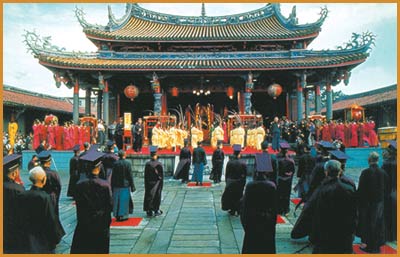
The present-day adherents of Confucianism, a religion of “ancestor worship,” celebrate the birthday of the founder of their superstitious faith with various rituals.
Confucius used the traditional superstitious Chinese beliefs as his basis when formulating his rules governing family life. He integrated the heretical reverence of his forefathers into his system, and pagan rites and perverse sacrifice rituals became important features of it.
This perverse worship of ancestors is an important aspect of Confucianism. Today, as in the past, shrines devoted to ancestors occupy one of the corners in the homes of most Chinese people. “Ancestor Tablets” are kept there which contain the names of their forefathers. Chinese people perversely make sacrifices and offerings to these tablets, and marriage ceremonies are conducted in front of them. Food, fruit and drinks are placed before them. It is believed that the spirits of ancestors come here to rest. Each local community celebrates two festivals a year for their common ancestors with music and dancing, by which they try to please and entertain their ancestors, at least in their own eyes. It is believed that the spirits of their ancestors can only find peace and happiness in this way, but no one ponders the irrationality of such bewildering offerings and no one realizes that the spirits they believe to make contact with have no power or influence over anyone’s life. They perform these rituals blindly, unconsciously and habitually. Despite China's having a rational education program or being a global leader in scientific thought does not prevent anyone from performing these heretical rituals, because the supposed worship of ancestors’ spirits is so deeply ingrained in the Chinese mind.
Confucius is one of the spirits people seek to honor by performing rituals for him. These perverse ritualistic practices are still continued today. Peking University holds the Confucius tablets.133
Reverence and respect for ancestors become a pagan ritual in superstitious Chinese religions. Much of Chinese society has inherited the practice of exalting ancestors to the level of divinities, and this practice still continues after many centuries. Without ever questioning the propriety of these practices, these rituals have been a major part of Chinese life for centuries. Allah reveals in His verses that ancient nations followed their forefathers’ heretical practices:
They found their fathers misguided and they are following hard upon their heels. (Surat as-Saffat: 69-70)
Despite the heretical practices in the Confuciusian system, it does however contain some aspects which are compatible with the morality of the Qur’an. Confucius aimed to establish a social order that based the relationship between people on mutual love and respect. His ethical philosophy was successful in creating a sense of responsibility, honesty and dedication in the individual and thus played a major role in shaping the morality of the Chinese people in many respects.
His maxim of “Do not do unto others that you do not wish done to you” became one of the central tenets of Confucianism.
These positive aspects of Confucius’ doctrine played a major role in the acceptance of it as a moral philosophy. However, it is not possible for a philosophy that is not based on faith in the almighty Lord and fear of Him to lead people to salvation. People can only attain true happiness in this life as well as in the hereafter by believing wholeheartedly in Allah and by submitting to Him.
As we had mentioned earlier, with the emergence of Confucianism Shamanism had declined in Chinese society but returned later under the name Taoism. Taoism represented ancient Chinese culture and Chinese folk religion. Whereas Confucianism had a greater influence on the state bureaucracy and the educated classes, Taoism became popular with the masses.
In the present day, Taoism is practiced in China, Japan, North and South Korea, which is where the majority of its adherents live. It is estimated that there are approximately twenty million Taoists around the world, but some sources estimate this figure could be as high as ninety-five million, as various beliefs in China merge, making it more difficult to determine the number of Taoists there. Taoism has spread to all corners of the world, albeit not as a religion. People around the world have chosen to adopt some aspects of Taoism and not others. For instance Taoist practices like acupuncture, alternative medicine, fortune telling, meditation and astrology have gained widespread acceptance in the west.
It is believed that Taoism was founded by Lao-Tse around 500 BC, yet nothing is known of him, and there is some doubt as to whether he even existed. Some sources claim that Lao-Tse was an archivist who migrated to the West in his old age where he dictated his book The Way of Virtue to a customs official. Taoists consider this book Tao Te Ching as their supposed sacred scripture. It has two parts, and the text consists of 5000 words. It is believed to have been written by Lao-Tse.
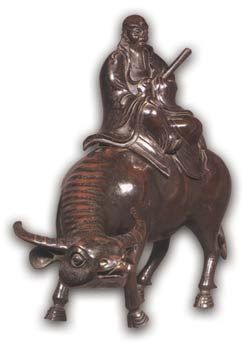
A statue of Lao Tzu, the founder of Taoism.
Taoism is presented as a path leading to people to peace, happiness and a balanced life, but this definition does not reflect the truth because the mystical and philosophical statements it makes lead people to false beliefs, sorcery, worthless causes, magic, despair and inaction.
It is a difficult task to define Taoism as it has been constantly changing with superstitious traditions passed on from generation to generation, and the influences of Confucianism and Buddhism. A general definition says that it is the path that must be followed through life; in other words, it is a way of life based on certain principles, which are not based on Allah’s revelation. This is why Taoism contains many contradictions, much nonsense and also explanations that are not compatible with reason or common sense.
Taoists believe that man is a part of the ongoing cosmic process called Tao (The Way). His most crucial choice in life is between recognizing this reality, thus becoming one with it, or to resist and remain outside of the Tao. According to this false and perverse belief man has been created by the Tao and will return to it. The Tao is the basis of, and the creative power behind everything. Taoism does not recognize the belief in the Almighty and All-powerful Allah. The Tao is considered to be the so called “cause that governs” the world without a consciousness, soul or identity; the Tao is more of an abstract phenomenon. Questions as to how it created the miraculous balance and order in nature and the universe remain unanswered. Taoists prefer to believe in an abstract term called “Tao” instead of believing in Allah’s absolute existence. For that reason they fall into a terrible perversion.
Yet the mystical aura of Taoism attracts many people and it can spread among the ignorant with relative ease. In reality however, it is a heretical, highly decorative and philosophical belief system that causes people to distance themselves from rational thoughts given up for a life of erroneous beliefs. For instance, a fictitious principle of faith in Taoism is “Yin” and “Yang”. These two words stand for a lot of things in Taoism. Life in the universe is based on the principle of “Yin” and “Yang” where Yang represents all that exists on earth and Yin all that does not. Yin is thought to be the breath that created the world and it is described with words like cold, evil, dark and negative energy. Yang on the other hand is thought as warm, good, bright and positive energy. Books on Taoism frequently mention that Yin and Yang could not exist without one another and everything should have a balance of Yin and Yang. Such statements sound quite important, but in reality they are not saying anything about the truths revealed by Allah.
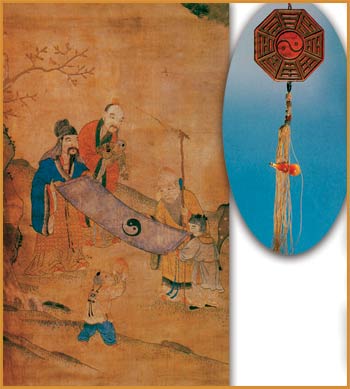
(top) A charm symbolizing the philosophy of the yin and yang, which represents the essence of Taoism but which provides no information at all about the reality of life. (Side) A 17th century picture showing young and old working with the superstitious yin-yang symbol.
Taoism is an idolatrous religion that perversely reveres almost anything as supposedly divine. Every imaginary deity supposedly worshipped in Taoism is believed to represent an aspect of the Tao. For instance, Yu-huang is one of the most important deities in Taoism and all other deities are believed to be answerable to him. According to this pagan belief Yu-huang measures the other deities’ performance on a yearly basis and either rewards them by increasing their responsibilities or punishes them accordingly. It is interesting to note that Taoists do not pray to these deities as they do not believe them to be able to help them overcome their problems. Taoists believe that this can only be done by observation, contact with the spirits, sorcery and meditation. A Taoist has to be thoroughly trained to learn the name, rank and powers of the relevant deities as well as meditation and visualization methods in order to benefit from them.134
Many Taoists place the icons of their deities in wardrobes in their homes. These deities have a different meaning for each Taoist. Most Taoists worship the imaginary war god Kuan-Ti and the so-called god of commerce, Sai Shin. The polytheism common to pagan religions like Hinduism, Jainism and Shintoism is also deeply rooted in Taoism. We have stated repeatedly in this book that they imagine that worshipping stone or wooden idols and making offerings to them is a fundamental perversion and irrationality. Allah reveals in the Qur’an that these kind of pagan societies have existed throughout history. Taoists are no different. Allah makes an example of the Israelites in the Qur’an. During the migration of some of the Israelites together with the Prophet Moses (pbuh), and after their rescue from persecution by Pharaoh, they met an idolatrous people on the way and requested of the Prophet Moses (pbuh) that he make them an idol just like theirs. This incidence is revealed in the Qur’an as follows:
We conveyed the tribe of Israel across the sea and they came upon some people who were devoting themselves to some idols which they had. They said, “Moses, give us a god just as these people have gods.” He said, “You are indeed an ignorant people. What these people are doing is destined for destruction. What they are doing is purposeless.” (Surat al-A‘raf: 138-139)

Taoists superstitiously regard all entities, living or inanimate, as divine, and are far too bewitched to realize the enormous dimension of the error they are committing.
Some of the Israelites acted in ignorance and requested a supposed deity they could see with their own eyes, before which they could prostrate themselves or could perform heretical rituals. This situation reveals the level of their ignorance and that they did not appreciate or comprehend Allah’s providence. Despite the fact that the Prophet Moses (pbuh) explained the truth to them they acquired an idol as soon as he left them, which was a grave sin. They eventually repented as revealed in the Qur’an:
After he left, Moses’s people took the Calf (for worship) made from their ornaments, a form which made a lowing sound. Did they not see that it could not speak to them or guide them to any way? They adopted it and so they were wrongdoers. When they took full stock of what they had done and saw they had been misled, they said, “If our Lord does not have mercy on us and forgive us, we will certainly be among the lost.” (Surat al-A‘raf: 148-149)
However, Allah responds to those who take the Calf as deities and do not repent:
As for those who adopted the Calf, anger from their Lord will overtake them together with abasement in the life of this world. That is how we repay the purveyors of falsehood. (Surat al-A‘raf: 152)
It is revealed in the above verses that Allah can choose to forgive those who ascribe partners to Him as they are in reality falling for a lie. Whereas Allah is clearly the one and only God, they adopted false idols for worship. To prostrate before them is a grave sin. The Taoists’ situation is like that of all pagan people throughout history; They are also a people who are numbed with superstitious nonsense and teachings, and unable to see the perversion in which they found themselves. They cling to the religion of their forethers, as if they had been bewitched. If they were to seriously contemplate on these heretical beliefs, to listen to the voice of reason and conscience, to seek the righteous path and to closely examine their ancient teachings and superstitious traditions with discernment, they would surely realize the existence of Allah, His power and compassion.
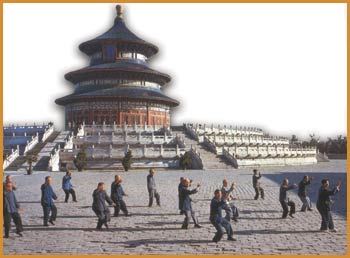
Taoist shamans of the kind shown in the picture claim to be able to cure disease and drive out evil spirits to the accompaniment of various dances.
One of the greatest quests of the ancient Shamans was to find ways of achieving immortality in this life by means of sorcery, spells and alchemy. Taoists inherited this dubious idea from Shamans and never ceased to pursue this quest. Martin Palmer explains this perverse belief in his book titled World Religions, A History of Faith:
Taoists believe that they can achieve immortality for their bodies by means of rituals and diets. The quest for immortality and supernatural powers has an important place in Chinese mythology. Immortal characters with supernatural powers in Chinese legends and films are representative of this belief. In some beliefs, certain foods and drinks provide immortality, whereas in others, daily meditation delivers this goal.135
Taoism’s central message lies hidden in this labyrinth. They have sought to achieve immortality for many centuries by making potions from certain herbs. All the diets, exercises and massage methods are the result of this quest. This quest may well have led to a certain amount of progress in herbal medicine, but it is doomed to fail in its ultimate objective. It is not possible to achieve anything but good health by these efforts, because Allah has created every human being as mortal. Once man’s trial on earth is complete, he will die. Allah says:
We did not give any human being before you immortality. And if you die, will they then be immortal? Every self will taste death. We test you with both good and evil as a trial. And you will be returned to Us. (Surat al-Anbiya’: 34-35)
People who have sought immortality or to live for a thousand years are mentioned in the Qur’an. Allah says in one verse:
Rather you will find them the people greediest for life, along with the idolaters. One of them would love to be allowed to live a thousand years. But being allowed to live would not save him from the punishment. Allah sees what they do. (Surat al-Baqara: 96)
There is not one human being who has been able to protect himself against aging and death, and there is no one who will not die, because man is not the proprietor of his body and life. The fact that he has not himself chosen to live is proof for this. Another indicator of this is the fact that he cannot prevent his death. The Owner of all life is the One that gives it, and He takes it again when He wants. All the people who have come before, and all who are with us today, and all the people who will come after us have, or will, die. Allah reveals this reality in the following way:
Every self will taste death. You will be paid your wages in full on the Day of Resurrection. Anyone who is distanced from the Fire and admitted to the Garden has triumphed. The life of this world is just the enjoyment of delusion. (Surah Al ‘Imran: 185)
This world is a place of learning. Allah has given people various responsibilities and revealed His limits. If man observes these limits, obeys the commandments and refrains from what is forbidden to him, he will spiritually, intellectually and consciously mature. He learns to be patient, never to compromise on Allah’s religion, to turn to Him in all matters and to seek only His help. He also learns to respect Him appropriately and to fear, respect and love Him in equal measure. He thus acquires a pure faith and total submission to Him. He comes to appreciate Allah’s providence truthfully and thus his gratefulness, love and proximity to Allah is enhanced and finally he becomes a perfect believer of superior mind and character. He becomes a person who is deserving of entrance into Allah’s glorious paradise
Man is tried by the many events in his life and according to his success or failure, he either deserves reward or punishment. No one knows when his trial will end. Death is “at a predetermined time” (Surah Al ‘Imran: 145) as revealed by the Qur’an. Life can be sometimes long and sometime short. Even the longest lives rarely exceed 70 or 80 years.
For this reason, man should realize that he is answerable to Allah, that he will be held accountable for all his actions in life and that he should live by the guidance provided by the Qur’an and our Prophet (may Allah bless him and grant him peace) instead of scheming for a long life. If he does not prepare for his eternal life, if he misses this one opportunity to enter paradise, he will have met a truly sad end. For this reason, every wasted second is a great loss and a step towards a sorrowful end.
Man should prepare beforehand for all eventualities and death is a certainty. When he encounters death, he will be alone and subsequently face judgment alone: “You have come to Us all alone just as We created you at first, leaving behind you everything We bestowed on you”(Surat al-An‘am, 94) Those who seek eternal salvation are advised by Allah as follows:
You who believe! Have fear of Allah and let each self look to what it has sent forward for Tomorrow. Have fear of Allah. Allah is aware of what you do. Do not be like those who forgot Allah so He made them forget themselves. Such people are the deviators. (Surat al-Hashr: 18-19)
Confucians on the other hand are quite content with this life on earth as if they are never to die. Allah reveals such people’s condition as follows:
Say: “Shall I inform you of the greatest losers in their actions? People whose efforts in the life of the world are misguided while they suppose that they are doing good.” (Surat al-Kahf: 103-104)
Allah expands provision to anyone He wills and restricts it. They rejoice in the life of the world. Yet the life of the world, compared to the hereafter, is only fleeting enjoyment. (Surat ar-Ra‘d: 26)
Those who are blind in the world will be blind in the hereafter and even further off the Path. (Surat al-Isra’: 72)
Chinese people since ancient times have practiced fortune telling, astrology, spell casting, healing and sorcery. They developed meditation, breathing and healing techniques in their quest for immortality; this inevitably led them one way or the other into paganism.
Some Taoist movements focused on sorcery, calling on so-called divine spirits, making offerings to the deceased, casting spells for rain and winds, healing and exorcism. The Chinese were more inclined to divert their search for immortality from the field of medicine to sorcery. There were also sects of immortality, and one of the most important leaders of such movements which emerged from the Taoist school was Chang Tao Ling (AD 34) Tao Ling is acknowledged to be the founder of today’s Taoism of sorcery and superstition. According to Taoist legends, Ling received from Lao Tse the sword and other tools from the world of spirits and thus came to control this world. Such movements believed that it was possible to achieve immortality by means of meditation, breathing exercises and control, stretching, bathing, diet, use of medicines, and altering the positions of the body; one of the humorous side effects of this quest for immortality was the absurd belief that one could attain invisibility! Tang-Yie-Jie from Peking University describes the irrational and illogical aspects of the search for immortality in his book titled Confucianism, Buddhism, Daoism, Christianity and Chinese Culture as follows:
At the end of the Warring States period (that is the third and second centuries B.C.) there existed people who called themselves “immortals” and claimed that by certain practices they could “extend their lives and not die”… How can people keep from dying? The ideal in the Taoist religion is for people to “extend their lives and not die,” to “fly up in this very body” that is, to become an immortal… if you die, everything is finished, so in order to seek to extend life, first, you must get a body that does not decay so that the spirit or soul will have a place to abide… Daoism (Taoism) has various methods to accomplish this purpose. The most basic of these are two sorts? The outer pill and the inner pill. The outer pill consists of using various minerals, especially mercury, in order to concoct a potion. It is hoped that by ingesting various potions one can keep one’s body from decaying, and then the soul can continue forever in its midst. They claim that if you put a bronze mud on your feet and soak your feet in water for a very long time, you will not decay. If you can find the so-called golden pill, once you eat it your whole body will be able to live forever without decaying.136 Almost all religions seek to solve the problem of what will happen to man after his death, but Daoism (Taoism) in China alone chooses belief in Daoism (Taoism) for “living in eternity” and for “the body of flesh to become immortal.” Therefore, finding a solution to the question of life and death, seeking deliverance and immortality, and finally reaching the state of “living in eternity” are characteristics of Daoism (Taoism). Daoism advocates realizing immortality in the flesh, man can leave this bitter reality and enter the word of immortality.137
In reality all these pagan beliefs are nonsensical. As we have previously stated, it is impossible for any man to acquire immortality in this life unless Allah wills it. Our Lord has created every human being as mortal beings, and every one of us will die when the time has come. No medicine, no healing, no diet or any other method can prevent death. Allah states the following:
Wherever you are, death will catch up with you, even if you are in impregnable fortresses. If a good thing happens to them, they say, “This has come from Allah.” But if a bad thing happens to them, they say, “This has come from you.” Say, “Everything comes from Allah.” What is the matter with these people that they scarcely understand a single word? (Surat an-Nisa’: 78)
No indeed! We have given these people enjoyment, as We did their fathers, until life seemed long and good to them. Do they not see how We come to the land eroding it from its extremities? Or are they the victors? (Surat al-Anbiya’: 44)
Taoism has had many ups and downs in its long history. As noted earlier, Taoism was a respected belief until the rise of the Han dynasty, but with the emergence of Buddhism in the 6th century it began to decline. It was promoted again in the 8th century by Emperor Hsuan Tsung, but the Manchu emperor declared the Taoist teachings a heresy once more.

It has been revealed to you and those before you: ‘If you associate others with Allah, your actions will come to nothing and you will be among the losers.’ (Surat az-Zumar: 65)
With the arrival of communist rule in China, all religions were prohibited. The new regime forced all monks to work in agriculture, closed the temples and confiscated their property. By the year 1960, the number of monks had declined from several million to about 50,000. During the Cultural Revolution, which took place between the years 1966-1976, whatever was left of the Taoist heritage was largely eradicated. During this time all but a few temples were closed, thousands were destroyed, and 95% of all idols and icons were destroyed by fanatical Red Guards, and this almost succeeded in eradicating Taoism.
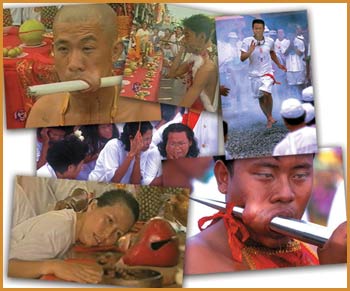
Throughout the course of this book we have looked at many heretical traditions and superstitions belonging to Far Eastern religions. We have seen, for example, how Hindu tradition encourages the burning of women and the burying of female children while they are still alive. However, Far Eastern religions actually play host to far wider ranging scenes of savagery. One of these is what happens during the “Vegetarian Festival” in the Chinese region of Phuket.
The aim of this peculiar festival, which has taken place on a regular basis every year since the early 19th century, is to pay respects to the supposed Chinese gods. These nonsensical displays of “respect” involve terrible practices that it is difficult even to look at. The reason why the event is called the “Vegetarian Festival” is that people refrain from eating meat and consume only fruit and vegetables during the 9 days it lasts. The Chinese hold the superstitious belief that in this way they can cleanse their souls and bodies of evil.
Throughout the festival, people misled into thinking that imaginary “spirits have entered their bodies” pierce their cheeks, tongues or other parts of their bodies. They then insert knives, sticks, various metal objects, tree branches or other such objects into these holes. Everyone’s face is covered in blood. The Chinese public, blindly devoted to their perverted traditions, watch this savage ritual with great amazement. These people wander round the streets, eating what people offer them. According to this ridiculous Chinese belief, anyone touching these individuals will be cured of sickness and receive positive energy. These people, in a state of trance, lose all control of themselves and walk on fire, walk up steps made out of sharpened knives, pour boiling oil over themselves, and generally torture themselves for 9 days. They say that they inflict these tortures for the sake of their supposed gods, and that their souls and bodies are purified by means of them. These people are so devoid of reason and logic as to claim their souls can be cleansed by plunging skewers into their cheeks. The fact is, however, that the human soul can only draw apart from evil and attain a pure conscience through the will bestowed by fear of Allah, proper moral virtues and profound faith. Superstitious beliefs to the contrary, on the other hand, are the natural consequence of the dark state of the soul of people who do not believe in Allah. Because there is no limit to the depravity of an unbeliever. Since such people imagine they will never have to account for their deeds in this world they regard it as perfectly legitimate to oppress and murder, and inflict violence and savagery on themselves and those around them. As we have seen in the preceding chapters of this book, such people have no conception of sin and crime. They therefore regard every superstition commanded by their perverted traditions as true, and blindly follow them to the letter. However, people caught up in such a superstitious way of life need to know that human beings are not totally free. They are responsible for all their actions, and they will have to account for their every word and deed in the Presence of Allah. As our Lord asks in Surat al-Qiyama: “Does man reckon he will be left to go on unchecked?”
Following the rise to power of Deng Xiaoping in 1982, Taoism and the other superstitious beliefs began to be revived again. They were organized anew in the 1980s and some temples came to life again. At present the Taoist religion finds its adherents all around the world.138 Taoism comprises all the mystical far eastern traditions like meditation, yoga and fortune telling and constitutes “a major force in the atheistic heretical religions of the 21st century” which we will examine in greater detail in the coming chapters. The pagan New Age movement, described by the Vatican as “The arch enemy of Christianity of the century”, is nothing but an aberration promoted around the globe by certain materialist circles in order to prevent belief in Allah, at least in their own eyes.
123 Paulson, Ivar Zur Phänomenologie Der Schamanismus, 1964, P. 131 Http://Www.Folklore.Ee/Folklore/Vol4/Hoppal.Htm
124 N. A. Alekseev, The Early Forms Of Religion Of The Turkic-Speaking Nations Of Siberia, 1980, P. 63 Http://Www.Folklore.Ee/Folklore/Vol4/Hoppal.Htm
125 N. A. Alekseev, The Early Forms Of Religion Of The Turkic-Speaking Nations Of Siberia, 1980, Pp. 72-73 Http://Www.Folklore.Ee/Folklore/Vol4/Hoppal.Htm
126 S. M. Malinovskaya, Selkup Animistic Ideas, 1990 Http://Www.Folklore.Ee/Folklore/Vol4/Hoppal.Htm
127 Lehtisalo, Ajurakszamojed Mitologia Vazlata, 1924, P. 103 Http://Www.Folklore.Ee/Folklore/Vol4/Hoppal.Htm
128 Kenin-Lopsan, Magic Of Tuvian Shamans. 1993, P. 31 Http://Www.Folklore.Ee/Folklore/Vol4/Hoppal.Htm
129 A. Gogolev, The Mythic World Of The Yakuts, 1994, P. 19 Http://Www.Folklore.Ee/Folklore/Vol4/Hoppal.Htm
130 Barmich, Nenets Customs, Connected With Animistic Conceptions, 1990, S. 1-2 Http://Www.Folklore.Ee/Folklore/Vol4/Hoppal.Htm
131 His Family Name Wa K'ung, His First Name C'iu And His Second Name Cung-Ni. He Is Therefore Known By The Name Of "The Great Teacher Kung" Or K'ung Fu Chu, And Thus Confucius. He Became A Judge At The Age Of 50 And, In All Probability, Minister Of Justice In The Same Year. He Traveled For 13 Years In Order To Influence The Rulers Of Various Countries, But Failed. He Taught Throughout The Course Of His Life. Accounts Say That He Had 3,000 Students.
132 "Confucianism", Catholic Encyclopedia, Http://Www.Newadvent.Org/Cathen/04223b.Htm
133 Ibid.
134 Julian Pas, Historical Dictionary Of Taoism, Pp. 184-185. Http://Religiousmovements.Lib.Virginia.Edu/Nrms/Taoism.Html
135 Martin Palmer, The Times, World Religions, A History Of Faith, Times Books, London, 2002. P. 199
136 Tang Yie-Jie, Confucianism, Buddhism, Daoism, Christianity And Chinese Culture, Pekin Üniversitesi, 1991, Pp. 81-83
137 Ibid., P.167
138 Martin Palmer, The Times, World Religions, A History Of Faith, Pp. 196-203